Lasswell Harold D. The Political Writings of Harold D. Lasswell
Подождите немного. Документ загружается.

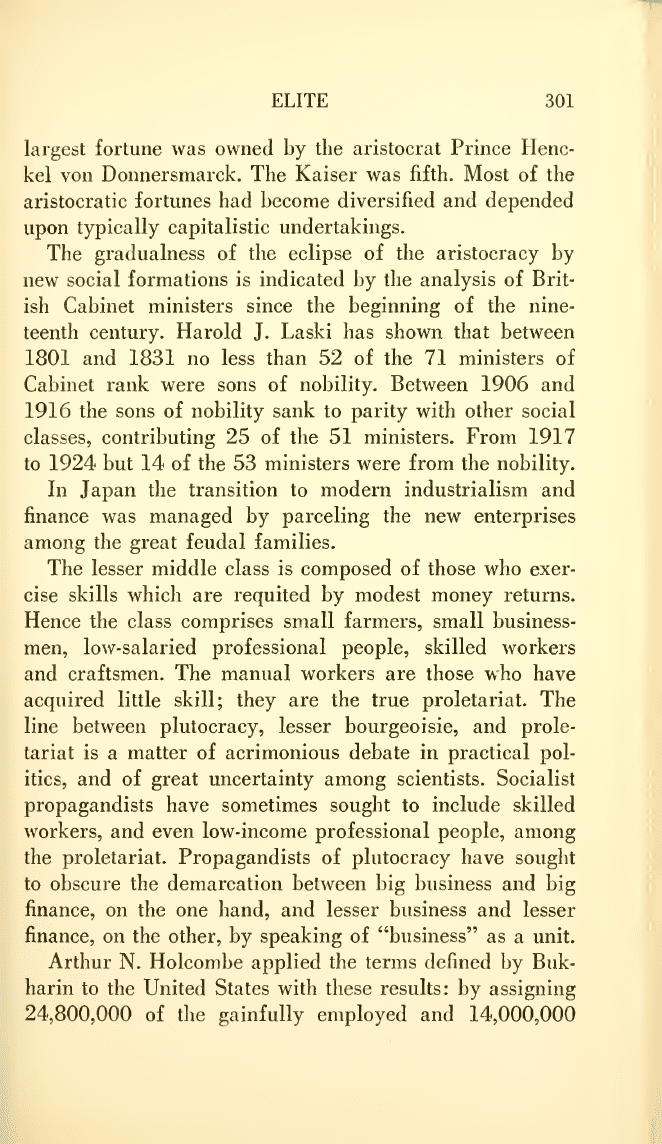
ELITE
301
largest
fortune was
owned by the
aristocrat Prince
Henc-
kel
von
Donnersmarck. The Kaiser was
fifth.
Most of the
aristocratic
fortunes had become
diversified
and depended
upon
typically capitalistic undertakings.
The
gradualness of the eclipse of
the aristocracy
by
new
social formations is indicated by
the analysis
of
Brit-
ish
Cabinet ministers since the beginning of the
nine-
teenth century.
Harold
J.
Laski has shown that between
1801 and 1831 no less than
52
of
the
71
ministers
of
Cabinet rank were sons of
nobility. Between 1906
and
1916 the sons of nobility
sank
to
parity
with
other social
classes,
contributing 25
of
the 51 ministers. From 1917
to
1924
but 14 of the 53
ministers were from the nobility.
In
Japan
the
transition
to
modern industrialism
and
finance was
managed
by
parceling the
new
enterprises
among the
great
feudal
families.
The lesser middle
class is composed of those
who
exer-
cise
skills which
are
requited
by
modest money
returns.
Hence
the
class comprises small farmers,
small business-
men, low-salaried
professional people, skilled workers
and craftsmen.
The manual workers are
those who have
acquired little
skill;
they
are the
true
proletariat.
The
line between plutocracy, lesser
bourgeoisie,
and prole-
tariat
is
a
matter of
acrimonious
debate in
practical
pol-
itics, and of
great uncertainty
among
scientists.
Socialist
propagandists
have
sometimes
sought
to
include skilled
workers,
and
even low-income professional people,
among
the proletariat. Propagandists
of
plutocracy have
sought
to obscure
the
demarcation between big business and
big
finance,
on the one hand, and
lesser business
and lesser
finance,
on the other, by
speaking
of
"business"
as
a
unit.
Arthur
N.
Holcombe applied the terms defined
by Buk-
harin
to the United States with these results: by assigning
24,800,000 of
the gainfully employed and
14,000,000
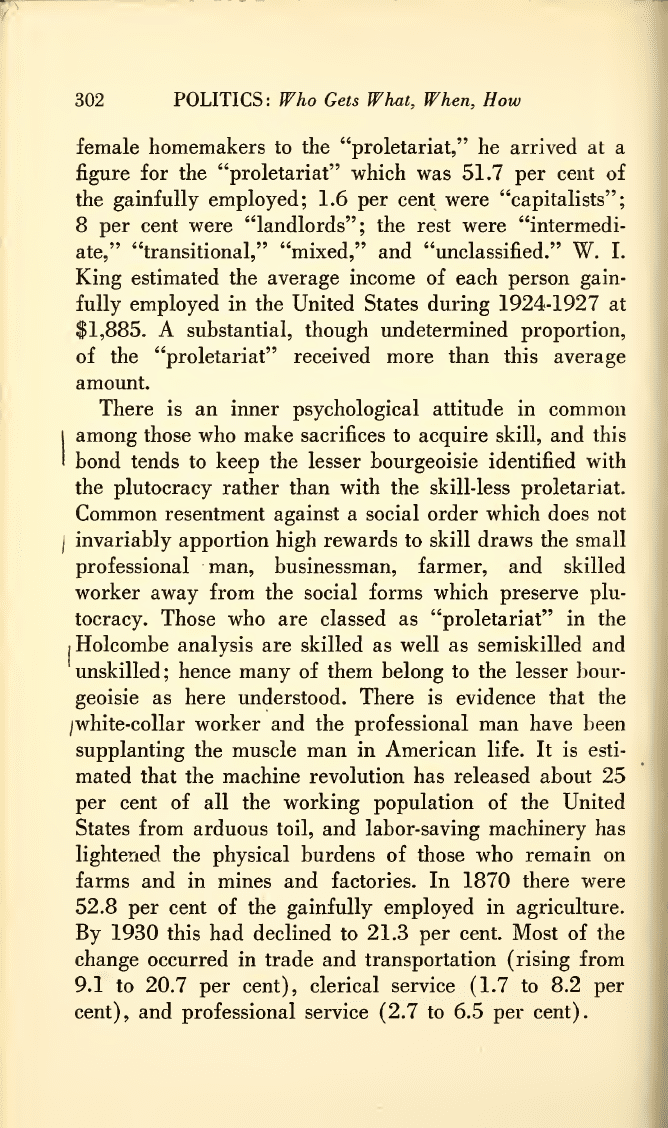
302
POLITICS: Who Gets
What, When,
How
female homemakers to the "proletariat,"
he
arrived at
a
figure for the
"proletariat"
which was
51.7 per
cent
of
the gainfully employed;
1.6
per cent were "capitalists";
8 per
cent were "landlords"; the rest were "intermedi-
ate," "transitional," "mixed," and "unclassified." W. I.
King estimated the average income of each person
gain-
fully
employed
in
the
United
States
during
1924-1927
at
$1,885.
A substantial, though undetermined proportion,
of the "proletariat" received more than this average
amount.
There
is an inner psychological attitude in common
among
those who make
sacrifices
to acquire
skill,
and
this
bond tends to
keep
the
lesser
bourgeoisie identified
with
the plutocracy
rather than with the
skill-less proletariat.
Common resentment against
a
social order which does not
invariably apportion high rewards to skill draws the small
professional man, businessman, farmer, and skilled
worker away from
the
social forms which preserve plu-
tocracy. Those who are classed as "proletariat" in the
iHolcombe analysis are skilled
as
well as semiskilled and
unskilled; hence many of them belong to the lesser bour-
geoisie as here understood. There is evidence that
the
/white-collar worker and the professional man have
]:)een
supplanting
the muscle man in
American life. It
is
esti-
mated
that the
machine revolution
has
released about 25
per cent
of
all
the
working population
of
the United
States from arduous toil, and labor-saving machinery has
lightened
the physical burdens of those who
remain on
farms
and in
mines
and factories.
In 1870 there were
52.8 per cent of the gainfully employed in agriculture.
By 1930 this had declined
to
21.3
per cent.
Most of
the
change
occurred in trade and
transportation (rising from
9.1
to 20.7 per cent), clerical
service
(1.7
to
8.2 per
cent),
and professional service
(2.7
to 6.5
per cent).
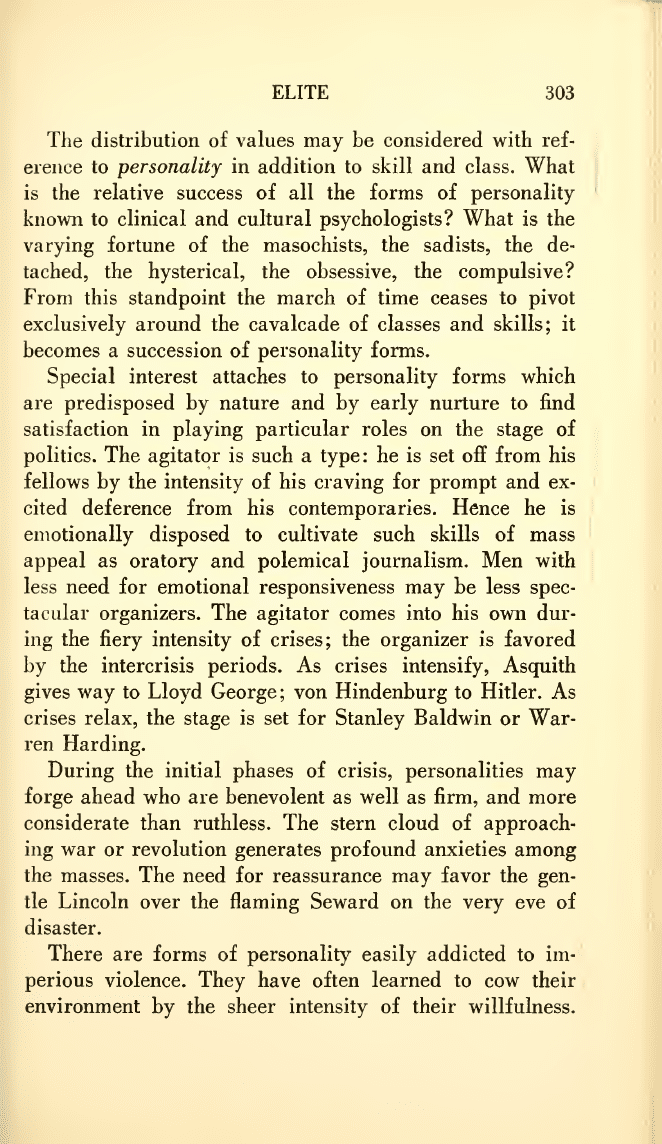
ELITE 303
The distribution
of values
may be
considered with ref-
erence to
personality in addition
to
skill and class.
What
is the relative success of all the
forms
of
personality
known
to
clinical and cultural psychologists? What is the
varying fortune
of
the masochists, the sadists, the de-
tached,
the
hysterical,
the obsessive,
the compulsive?
From this standpoint
the march of time ceases
to pivot
exclusively around
the
cavalcade
of classes and
skills; it
becomes a succession of
personality forms.
Special
interest attaches to personality forms
which
are
predisposed by nature and by
early
nurture to find
satisfaction in
playing
particular roles
on the
stage
of
politics.
The
agitator is
such a type: he is set
off
from
his
fellows
by the intensity of
his
craving for
prompt
and
ex-
cited
deference from his
contemporaries. Hence
he is
emotionally
disposed to cultivate such skills of mass
appeal
as oratory and polemical journalism. Men with
less
need for emotional responsiveness
may
be less spec-
tacular organizers.
The
agitator
comes into his own dur-
ing the fiery
intensity of crises;
the organizer
is favored
by the intercrisis periods. As crises intensify,
Asquith
gives
way to Lloyd George;
von
Hindenburg
to
Hitler. As
crises
relax, the stage is set for Stanley Baldwin
or War-
ren Harding.
During the initial phases of crisis, personalities
may
forge
ahead who are benevolent
as
well
as
firm, and more
considerate
than ruthless. The stern cloud of approach-
ing war
or revolution generates profound anxieties among
the masses.
The need for reassurance may favor the gen-
tle
Lincoln over the flaming
Seward on the
very
eve of
disaster.
There are forms of personality easily addicted
to
im-
perious
violence. They have often
learned
to cow their
environment
by the
sheer intensity of their
willfulness.
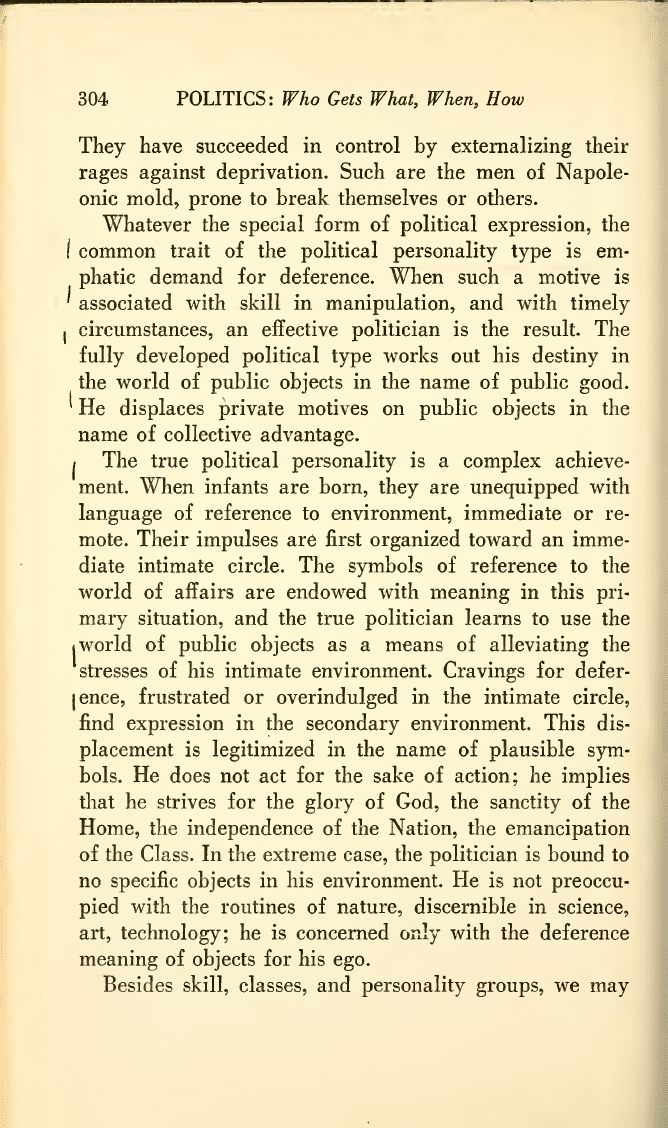
304
POLITICS: Who Gets What, When, How
They have succeeded in
control
by
externalizing
their
rages
against deprivation. Such are
the men of Napole-
onic
mold, prone to break themselves or others.
Whatever the
special form
of political expression, the
common
trait
of
the political personality
type is em-
phatic demand for deference.
When such a motive is
associated
with skill in manipulation, and with timely
circumstances, an effective politician is the result. The
fully developed political type works out his destiny
in
the
world of public objects in the name of public
good.
He displaces private motives on public objects
in
the
name of collective advantage.
I
The true political
personality
is a complex achieve-
ment. When
infants are born, they are unequipped with
language of reference
to
environment,
immediate or re-
mote. Their
impulses are
first organized
toward an imme-
diate
intimate
circle. The
symbols
of reference to the
world of
affairs
are
endowed with meaning
in this pri-
mary situation,
and the
true politician learns
to
use
the
I
world of
public
objects
as a
means
of
alleviating
the
stresses of
his
intimate environment. Cravings
for defer-
|ence, frustrated or overindulged in the intimate
circle,
find expression in the secondary environment.
This dis-
placement
is
legitimized in the name of plausible
sym-
bols. He does not act for the sake of action; he implies
that he strives for the
glory
of God, the
sanctity
of
the
Home,
the independence
of the
Nation, the
emancipation
of the Class. In the extreme
case,
the politician
is bound to
no specific objects in his environment.
He
is
not
preoccu-
pied
with
the routines of
nature, discernible
in science,
art, technology;
he is
concerned only with the
deference
meaning
of objects for his
ego.
Besides skill,
classes, and
personality groups,
we may
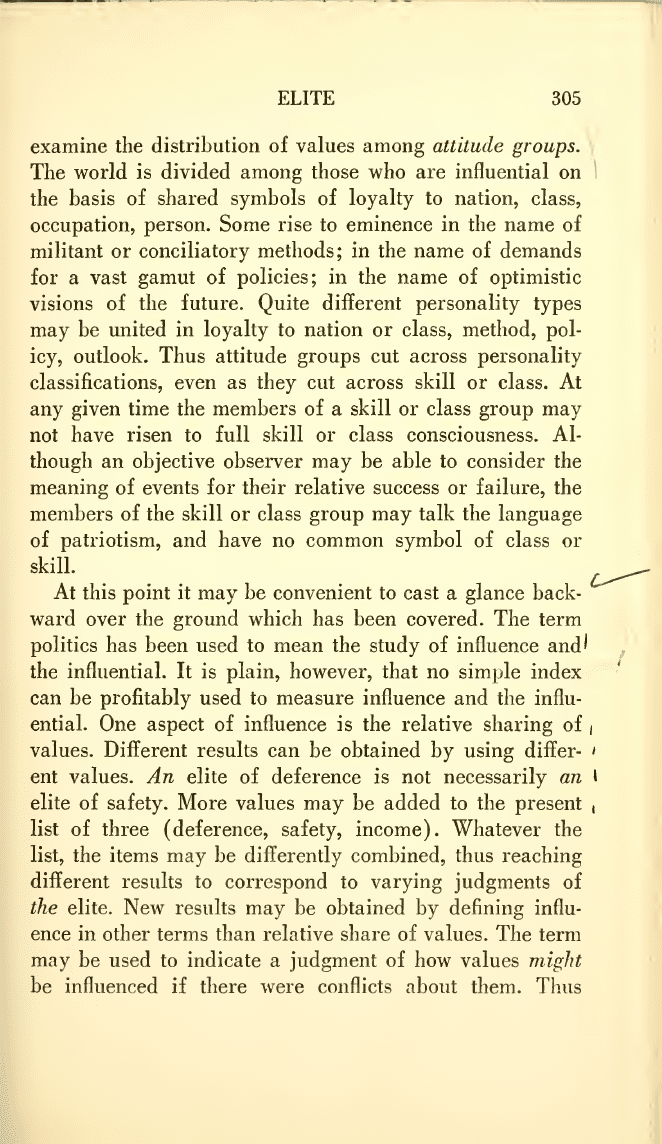
ELITE 305
examine the
distribution of values
among
attitude groups.
The
world
is divided among
those
who
are influential
on
•
the
basis
of shared
symbols
of
loyalty to nation,
class,
occupation,
person. Some
rise
to
eminence in
the name of
militant or conciliatory
methods; in the
name of demands
for a
vast gamut of
policies;
in the
name
of
optimistic
visions of
the future. Quite
different personality
types
may be
united in loyalty to nation
or class,
method, pol-
icy,
outlook. Thus attitude groups cut across personality
classifications, even as they cut across
skill
or class. At
any
given time the
members
of a skill or class group
may
not
have risen to full skill or class consciousness. Al-
though
an
objective observer may
be
able to consider
the
meaning
of
events for their relative
success
or failure,
the
members of
the
skill
or
class group may talk the
language
of
patriotism,
and have no
common symbol
of class or
skill.
At this
point it may be convenient to cast
a
glance back-
ward over
the
ground which has been covered. The term
politics
has been used to mean the study of influence
and'
the
influential.
It is plain, however, that no simple
index
can
be profitably used to measure influence and the
influ-
ential.
One aspect of influence is the relative sharing
of
i
values. Different
results can be obtained by using differ-
'
ent
values. An elite of deference is not necessarily an
I
elite
of safety. More values may
be
added to the present
,
list
of
three
(deference, safety, income). Whatever the
list, the
items
may
be
differently
combined,
thus
reaching
different
results to
correspond to
varying
judgments
of
the
elite. New results may
be
obtained
by
defining
influ-
ence in
other terms than relative share of values.
The term
may
be used to indicate a judgment of how values might
be
influenced
if there were conflicts
about them. Thus
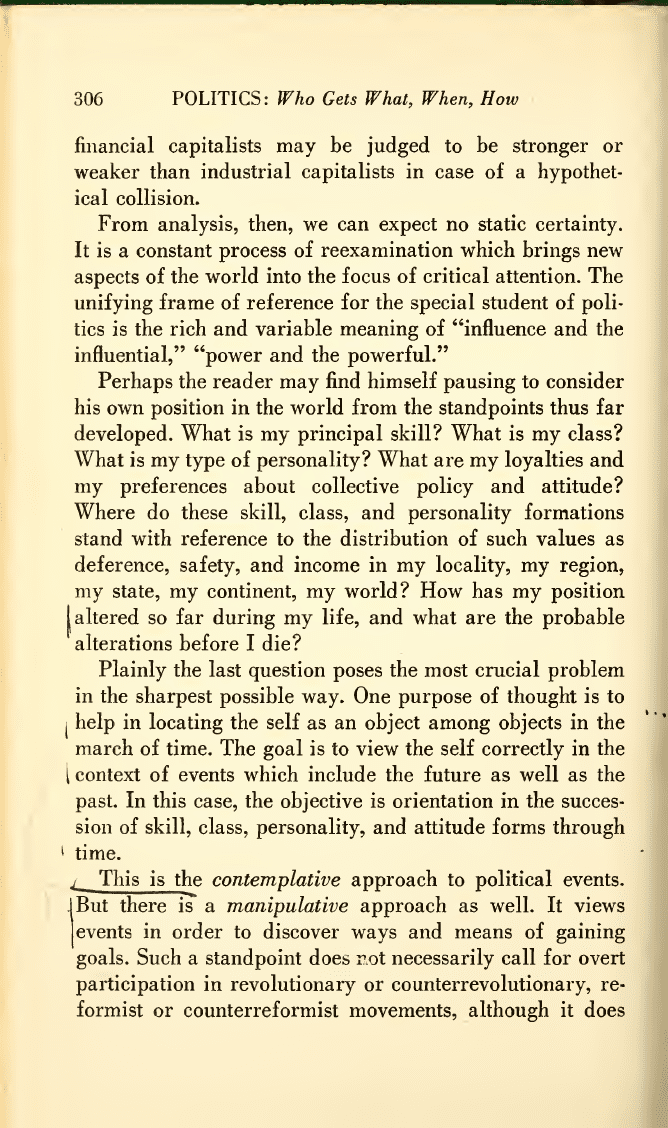
306
POLITICS: Who Gets What, When, How
financial
capitalists may
be judged to be
stronger or
weaker than
industrial capitalists in case of a hypothet-
ical collision.
From analysis,
then, we can expect no static certainty.
It is
a
constant
process of
reexamination
which brings new
aspects of
the world into the focus of
critical
attention. The
unifying frame of reference for the
special
student of poli-
tics is the rich and variable
meaning
of "influence and
the
influential," "power and
the powerful."
Perhaps the reader
may
find himself pausing
to consider
I
his own position in the world from the standpoints thus
far
developed. What is my principal skill? What is my class?
What is my type of personality? What are my loyalties and
my preferences about collective policy and attitude?
Where
do these
skill,
class, and
personality
formations
stand with reference
to the distribution of such values as
deference,
safety, and income in my locality, my
region,
my state, my continent,
my
world? How
has my position
(altered so far during
my
life,
and what are the probable
alterations
before I
die?
Plainly
the last question
poses
the most crucial problem
in the sharpest
possible way.
One
purpose of thought is to
I
help
in
locating
the self as an object among objects in the
march
of
time.
The goal is to view the self
correctly
in
the
i
context
of events which include
the future as
well
as
the
past. In this
case, the objective is orientation
in
the succes-
sion
of skill, class,
personality, and attitude forms through
'
time.
j__
This
is th
e
contemplative approach to political events.
iBut there is
a
manipulative
approach as well. It
views
events in order to discover
ways and
means
of
gaining
goals.
Such
a
standpoint does rot necessarily call for overt
participation
in
revolutionary
or
counterrevolutionary, re-
formist
or counterreformist movements, although it does
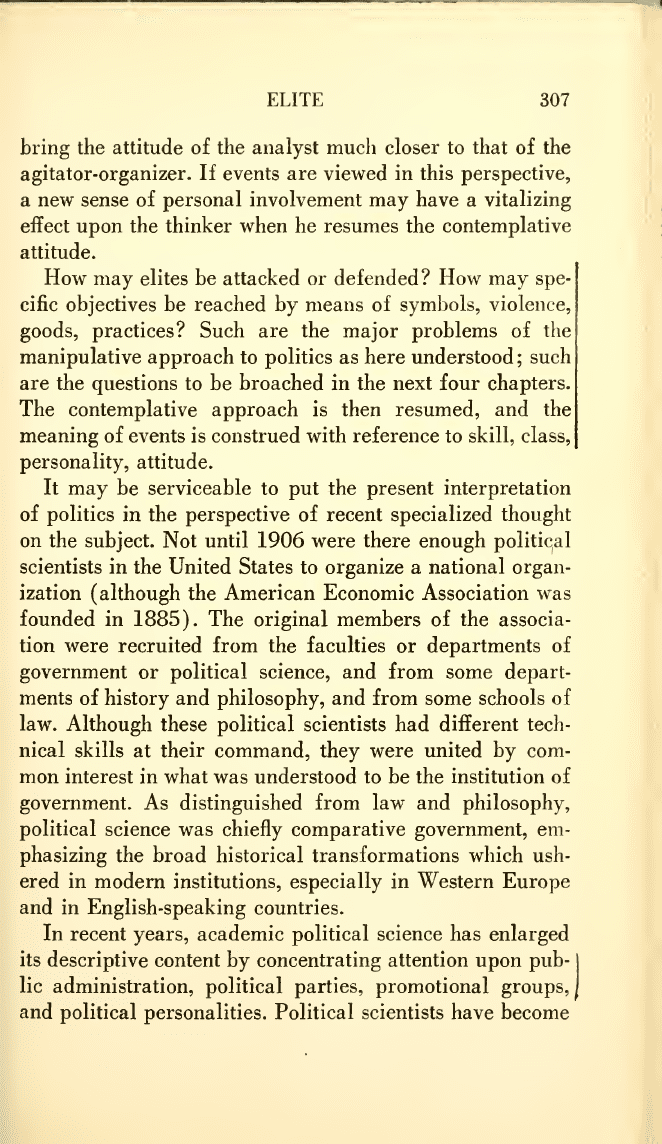
ELITE
307
bring the
attitude of the analyst much closer to that
of
the
agitator-organizer. If events are viewed
in
this perspective,
a
new
sense
of personal involvement may have a
vitalizing
effect upon the
thinker
when he resumes the
contemplative
attitude.
How may elites be attacked or defended? How may
spe-
cific objectives
be
reached
by
means of symbols,
violence,
goods, practices? Such are the major problems of
the
manipulative approach to politics as here understood ;
such
are the
questions to be broached in the
next
four
chapters.
The
contemplative
approach
is
then
resumed,
and the
meaning of events
is
construed with reference
to
skill, class,
personality,
attitude.
It may
be
serviceable
to put the
present interpretation
of politics in
the
perspective of recent specialized
thought
on
the subject. Not until 1906 were there enough political
scientists in the United States
to
organize
a
national organ-
ization
(although the American Economic Association
was
founded in
1885).
The original members of the associa-
tion were
recruited from the faculties
or
departments of
government
or political science, and from some
depart-
ments
of history and philosophy, and from some
schools of
law.
Although
these political
scientists
had
different tech-
nical
skills
at
their command,
they
were united by com-
mon
interest in what was understood to be the institution of
government.
As distinguished from law and philosophy,
political
science was chiefly comparative
government, em-
phasizing the broad historical transformations which ush-
ered
in modem institutions, especially in Western Europe
and
in English-speaking countries.
In
recent years, academic political
science
has enlarged
its
descriptive content
by
concentrating attention
upon
pub-
lic
administration, political
parties, promotional
groups,
and
political
personalities.
Political scientists
have become
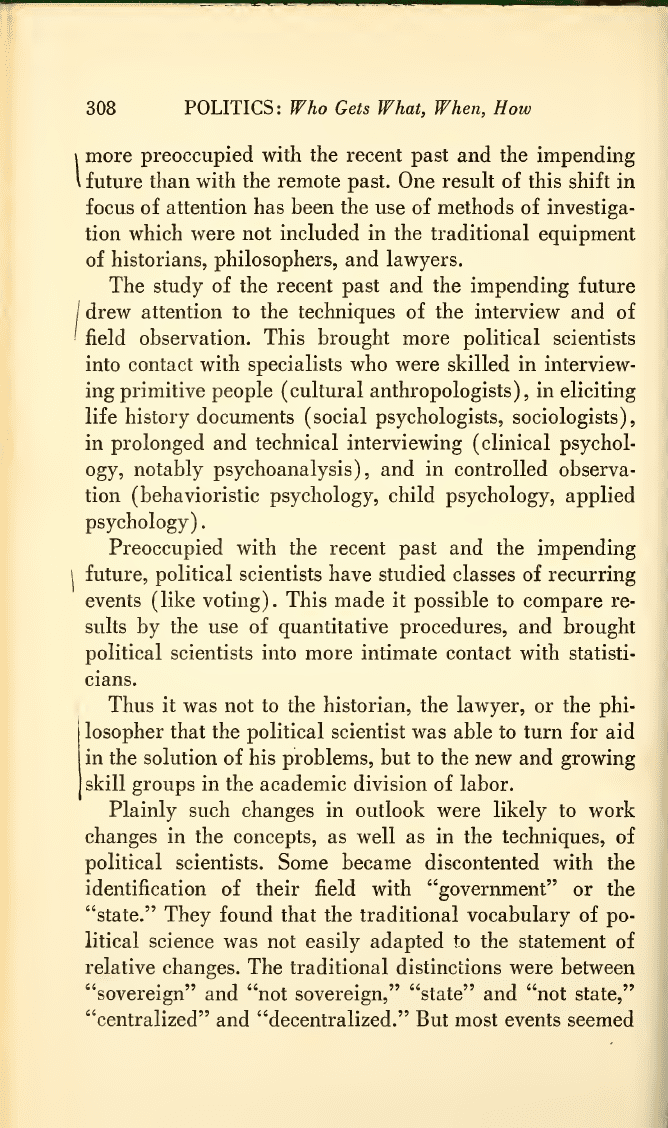
308
POLITICS: Who Gets What, When, How
\ more
preoccupied
with the recent
past and the impending
I
future
than with the
remote
past.
One
result
of this shift in
focus of
attention has been
the
use of methods
of
investiga-
tion which
were
not
included in the traditional
equipment
of
historians, philosophers, and lawyers.
The study of the recent past and the impending future
I
drew
attention
to
the techniques
of
the interview
and
of
'
field
observation. This brought more political scientists
into
contact with
specialists
who were skilled in interview-
ing primitive people (cultural anthropologists), in eliciting
life history documents (social psychologists, sociologists),
in prolonged and
technical interviewing (clinical
psychol-
ogy,
notably psychoanalysis), and in controlled
observa-
tion (behavioristic psychology, child psychology,
applied
psychology).
Preoccupied with the recent past and the impending
future, political scientists have studied classes
of recurring
events
(like
voting). This made it possible
to
compare
re-
sults by the
use
of quantitative procedures, and brought
political scientists into
more
intimate contact with statisti-
cians.
Thus it was
not
to
the
historian,
the lawyer, or the phi-
losopher that the political scientist was
able to turn for aid
in the solution of his problems, but to the
new and growing
skill groups
in the academic division of labor.
Plainly
such changes in outlook were likely to work
changes in the
concepts, as well as in the techniques,
of
political scientists. Some became discontented
with the
identification
of their field with "government"
or the
"state." They
found that the traditional vocabulary
of po-
litical science
was not
easily adapted to the
statement
of
relative
changes.
The
traditional distinctions were between
"sovereign"
and "not sovereign," "state" and "not state,"
"centralized"
and "decentralized." But most events
seemed
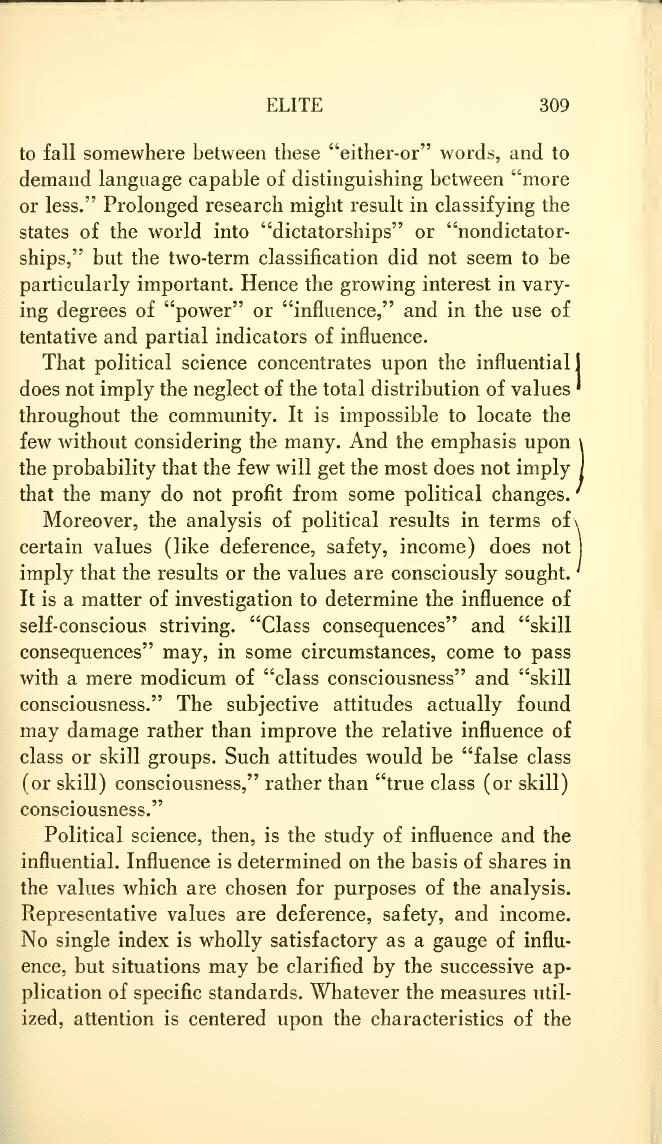
ELITE
309
to
fall somewhere
between these "either-or"
words,
and
to
demand
language capable
of distinguishing between "more
or
less."
Prolonged research might result in
classifying the
states
of
the world into
"dictatorships" or
"nondictator-
ships," but
the two-term classification did not seem to be
particularly
important. Hence the growing interest in vary-
ing degrees of "power" or "influence," and in the use of
tentative and partial indicators of influence.
That political science concentrates upon the
influential!
does not
imply the neglect of
the
total
distribution
of values
*
throughout the community. It is
impossible
to locate the
few
without considering the many.
And
the
emphasis
upon \
the
probability that the few will get the most does not
imply
/
that the many
do
not profit from
some
political changes.
'
Moreover, the analysis of
political results
in terms of
\
certain values (like deference, safety, income) does not
imply that the results or the values are consciously sought.
'
It is
a
matter of investigation to determine the influence
of
self-conscious striving. "Class consequences" and "skill
consequences" may, in some circumstances, come to
pass
with
a
mere modicum
of
"class consciousness" and "skill
consciousness." The subjective attitudes actually found
may
damage rather than improve the relative influence
of
class
or
skill
groups. Such attitudes would be "false class
(or skill) consciousness," rather
than
"true class (or skill)
consciousness."
Political science, then,
is
the study
of
influence and
the
influential.
Influence is determined on the
basis
of shares in
the
values which are chosen for purposes of the analysis.
Representative values
are deference, safety,
and
income.
No single index is wholly satisfactory as a gauge
of influ-
ence,
but situations may be
clarified
by
the
successive
ap-
plication
of specific standards. Whatever the
measures util-
ized,
attention is centered upon the characteristics
of the
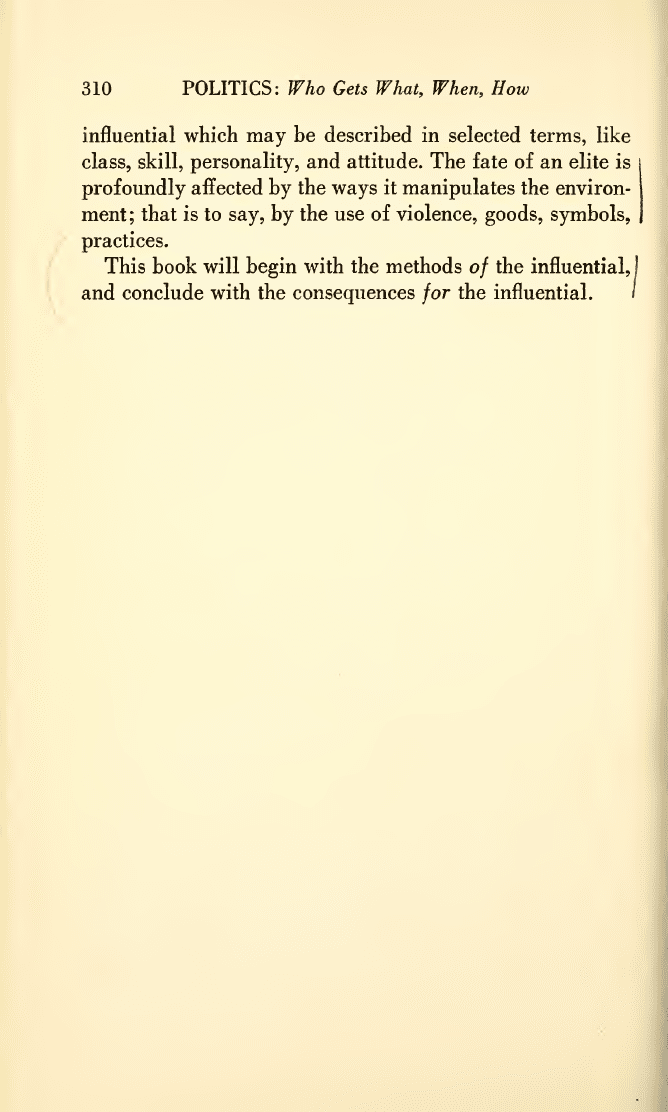
310
POLITICS:
Who
Gets
What, When,
How
influential
which may be described in selected terms,
like
class,
skill,
personality, and attitude.
The fate of
an elite is
profoundly
affected
by
the ways it manipulates
the environ-
ment; that is
to
say, by
the use of violence, goods,
symbols,
practices.
This book will
begin
with
the methods
of
the influential,
1
and conclude
with
the
consequences
for
the influential. /
